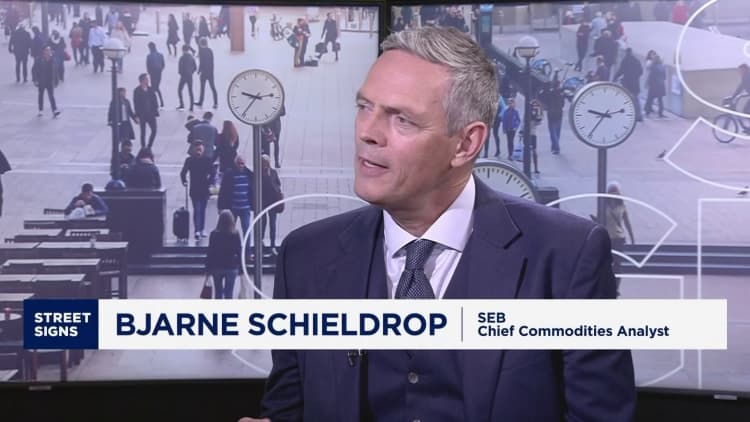WTI rises as Biden comments on Middle East risk. U.S. crude oil prices rose about 5% on Thursday, on pace for a third consecutive session of gains on fears that Israel could strike Iran’s oil industry in retaliation for Tehran’s ballistic missile attack this week.
President Joe Biden was asked by reporters Thursday morning whether the U.S. would support an Israeli strike on Iranian oil facilities. Biden said: “We’re discussing that. I think that would be a little – anyway.” The president added that “there’s nothing going to happen today.”

CNBC has reached out to the White House for comment. Biden’s comments were the catalyst that moved prices higher, said Daniel Ghali, senior commodity strategist at TD Securities. “Geopolitical risks in the Middle East are probably at their highest levels since the Gulf War,” Ghali told CNBC. The U.S. benchmark hit an intraday high of $73.95 per barrel, a gain of about 5.5%. West Texas Intermediate has gained about 8% this week and is on pace for its best weekly gain since March 2023.
Here are Thursday’s energy prices at around 1 pm ET until WTI rises :
- West Texas Intermediate November contract: $73.64 per barrel, up $3.54, or 5.05%. Year to date, U.S. crude oil has gained nearly 3%.
- Brent December contract: $77.43 per barrel, up $3.53, or 4.78%. Year to date, the global benchmark is slightly ahead.
- RBOB Gasoline November contract: $2.085 per gallon, up 4.99%. Year to date, gasoline has pulled back about 1%.
- Natural Gas November contract: $2.954 per thousand cubic feet, up 2.36%. Year to date, gas has gained nearly 18%.
The risk of oil supply disruptions increases as fighting in the Middle East intensifies, but OPEC+ is sitting on a large amount of spare crude that could step into the breach, according to Claudio Galimberti, chief economist at Rystad Energy. “This spare capacity is for now preventing runaway prices amid one of the deepest and most pervasive crises in the Middle East in the past four decades,” Galimberti told clients in a Thursday note.
OPEC+ spare capacity would be sufficient to cover a disruption to Iran’s exports if Israel strikes the Islamic Republic’s oil infrastructure as retaliation for Tehran’s ballistic missile attack, said Bjarne Schieldrop, chief commodities analyst at the Swedish bank SEB. The problem, however, is that the world’s spare oil capacity is heavily concentrated in the Middle East, particularly the Gulf states, and could also be at risk if a wider war breaks out, according to Ghali with TD Securities.
If Israel hits Iran’s oil industry, traders would begin to worry about supply disruptions in the Strait of Hormuz, Schieldrop said. “That would add a significant risk premium to oil,” he told CNBC’s “Street Signs Europe.” The strait is one of the most important trade arteries for oil in the world. As a consequence, oil prices could surge to $200 per barrel if Israel hits Iran’s oil infrastructure, Schieldrop said.
The rise in West Texas Intermediate (WTI) oil prices after President Biden’s comments on Middle East risks reflects how sensitive the energy market is to geopolitical conditions. Such comments can create uncertainty in the market, which typically drives oil prices up, especially when there are concerns about oil supplies from conflict-prone regions.
A few key “WTI rises” takeaways from the situation :
Geopolitical Risks: Tensions in the Middle East, one of the world’s major oil production hubs, can always affect global oil prices. When a major world leader like President Biden makes a statement highlighting risks in the region, the market can react quickly. This uncertainty often causes oil prices to spike, as investors seek protection from potential supply disruptions. Impact on the Global Economy: Rising oil prices can have a wide-ranging impact on the global economy. Rising energy costs can slow economic growth, raise inflation, and reduce consumer purchasing power. Countries that rely heavily on oil imports could feel the impact more.
Response to Tensions: Rising oil prices also reflect the market’s response to potential new conflicts or tensions. In such situations, investors tend to take a defensive stance, which can lead to sharp price fluctuations. Energy Policy and Energy Security: This situation reiterates the importance of sustainable energy policies and energy security. Countries must continue to look for ways to reduce their dependence on fossil fuels, invest in renewable energy sources, and promote energy efficiency to mitigate the impact of global oil price fluctuations.
Overall, President Biden’s comments on risks in the Middle East serve as a reminder that energy markets are highly influenced by geopolitical factors. These market responses can have far-reaching consequences, and it is important for governments and market participants to monitor and adjust their strategies according to changing global dynamics.
